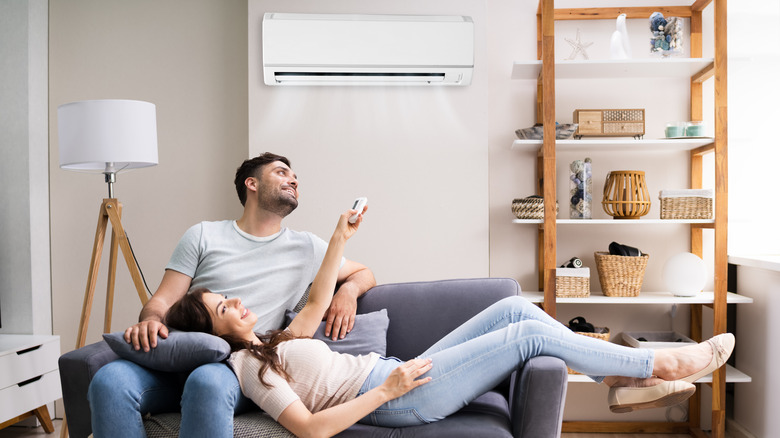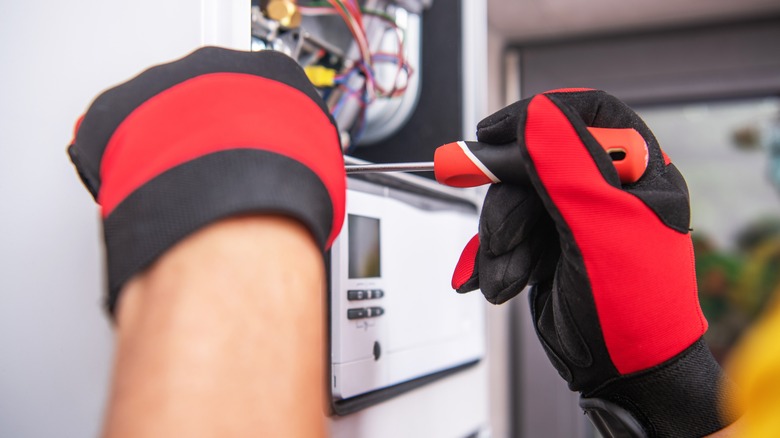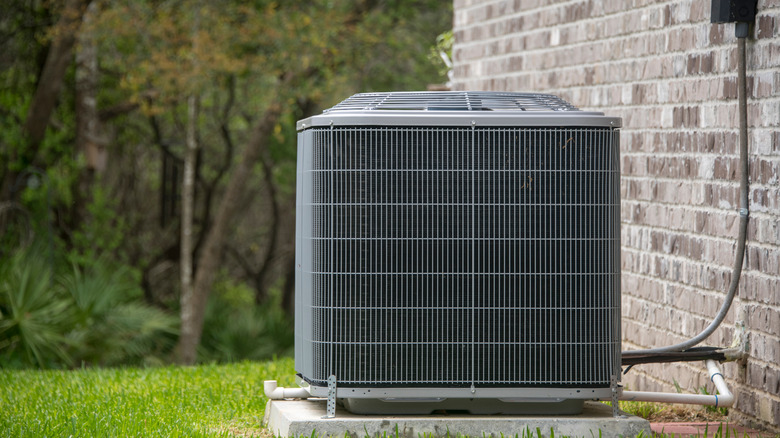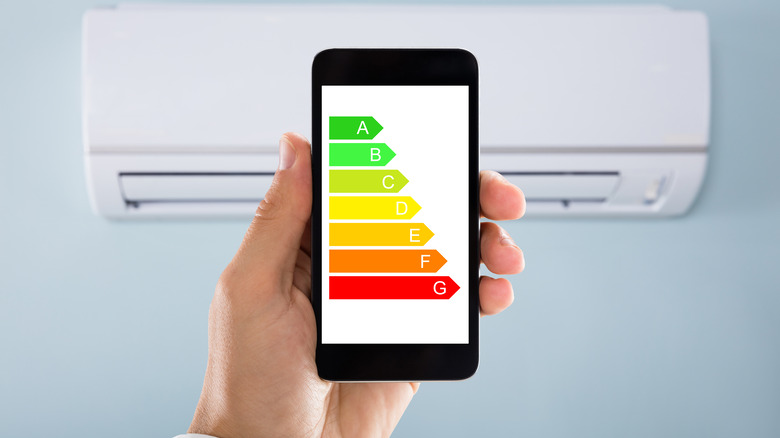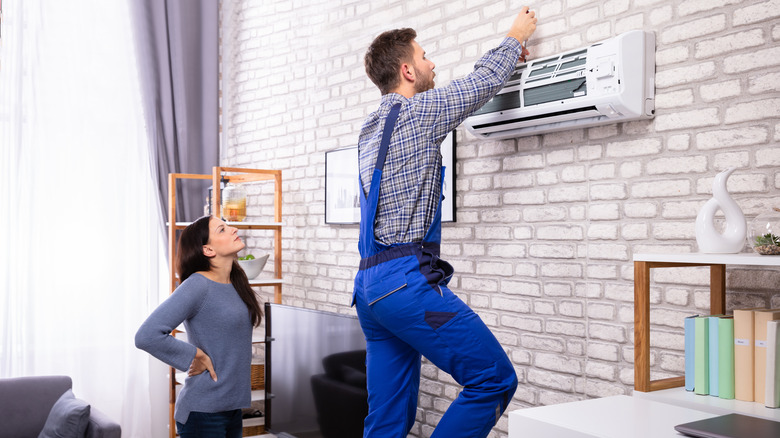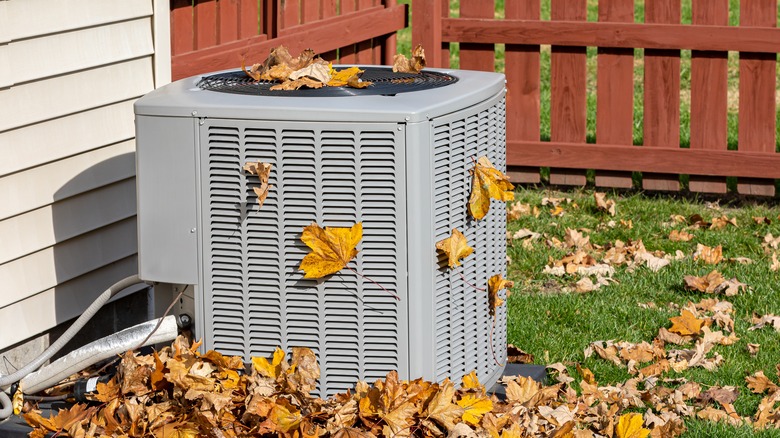Mistakes Everyone Makes When Buying An AC Unit
If you're trying to keep cool this summer, the first step you'll likely take is buying a new air conditioner. Sometimes slow-moving ceiling fans and clunky box fans just can't get the job done in steamy weather or long summer days. If you are considering an upgrade or simply replacing your old AC unit, be sure to avoid these common blunders and mishaps before placing your order.
Don't be intimidated by complicated technological terms such as compressors and condensers, energy ratings, and other factors, such as square footage and ductwork (via Jacob's Heating & Air Conditioning). Armed with just a few simple tips and conducting a few minutes of research are all it takes to transform your buying experience into a successful one. Just like purchasing a car or other big items, there is something out there that suits your needs and your budget — you just need to track it down. This article will cover everything you need to know — from the basics to the fine details — about buying an air conditioner the smart way.
Not assessing your needs
The first and most important step when making a large purchase is assessing your individual needs carefully. You'd be surprised how reassuring it can be to make a list, write down your concerns, or simply talk to your friends and family with experience or insights. According to American Standard, it can be risky and costly to assume your needs are one-size-fits-all, especially when air conditioning is quickly becoming a necessity. Rising temperatures, competitive rental homes, and overall comfort all point to needing a reliable and efficient unit.
Ask yourself these helpful questions to get started on what you need: What size AC does your home require; is an energy-efficient product important to you; do you need an indoor or outdoor unit? Once you have answers to these questions, you can delve into comparing products and brands. A little research could mean the difference between overspending, paying for unnecessary repairs, or buying replacements earlier than needed.
Not working out a budget early on
You may have a ballpark figure in your head, but it's crucial to sit down and establish a firm budget when making a large purchase like this, which means considering all the factors. Take a few moments to write everything down and calculate carefully. This will keep things fresh in your mind and help you stay on top of expenses and ongoing costs.
As noted by LearnMetrics, the size of an air conditioner can greatly affect both the money you'll need to spend to buy it and save for ongoing costs. Depending on how big the AC unit is and its energy-efficiency profile, different units will use different amounts of energy, affecting your monthly budget. Don't forget to also figure the cost of delivery and installation into your budget early on, as well as future repairs and warranties. Ductwork and insulation also need to be evaluated and possibly repaired for certain types of units. It's better to overbudget than be surprised.
Forgetting to consider your ongoing costs
Another common mistake that buyers make when budgeting is not considering the cost of running an AC unit every month, reports LearnMetrics. If your home currently runs on ceiling fans and window units, central air could cause a considerable jump in your energy bill. A helpful hint is to factor these numbers into your budget before you make a purchase.
A good starting point for ongoing costs is to estimate approximately $0.06 to $0.88 per hour to run an air conditioner. On a monthly basis, the average cost is $14.40 per month on the low end and $211.20 per month at the high end of the spectrum. Purchasing an air conditioner with a high energy efficiency rating, such as EER, SEER, and CEER could cut your ongoing monthly costs. However, the tradeoff may be that your unit costs more initially (via Trane). It all depends on your budget and what works for your individual needs.
Not understanding the differences between types of units
There are three main types of air condition systems to choose from. These systems function similarly but can still impact your ongoing cost and energy rating. The three most commonly used types of systems are ductless AC, packaged air conditioner, or split-system air conditioner, as reported by American Standard.
Ductless AC units are best used if you do not want to cool off your entire home but want different spaces to be at different temperatures (via Trane). These systems have one unit outside that connects to other units inside your home; however, ductwork throughout the house or to a specific room isn't necessary. These systems are ideal for sunrooms with many windows that are too hot in the summer and too cold in the winter or garages that aren't insulated.
Packaged air conditioners utilize your home's existing ductwork and employ a single unit outside, which pumps air through your ducts. Many buyers are drawn to the idea of a single unit that doesn't take up too much space (via Goodman Air Condition & Heating). Problems with these units are typically easy to trace as there's only one place of origin.
Split system air conditioners have an outdoor and indoor unit that work together to cool and control the humidity level in your home. These units take up more room and are often found in the attic or large cabinets. Compared to some other units, split systems typically require a little less maintenance and can be more efficient.
Additionally, in-unit conditioners or window units are not known for their filtration ability. Improvements have been made over the years, and new technology is introduced every day, but the filters in window units are hardly comparable to HVACs. This means if asthma or allergies are a concern, even in a small home, you may want to consider central air.
Forgetting about a warranty
An AC unit is typically a large expense or investment, which means that you should never skip over the warranty. For equipment used daily and prone to repairs, it's far easier to budget for a warranty than a replacement product. Small monthly fees or expenses are much more manageable than a lump sum of up to $10,000, depending on the size of your home, notes Forbes.
HVACs typically include some kind of manufacturer's warranty (via House Method). However, these generic warranties may only cover you if there's something defective with your new unit. They do not cover normal wear and tear, which will inevitably occur. These systems can run for hours a day, for months on end, and most of the time they're located outside of the home and prone to damage and other repairs. In order for typical HVA's to last the estimated 10 to 15 years, they must be maintained regularly. Broken compressor fans, drainage issues, and clogged air filters are all common wear and tear issues that could arise and may or may not be covered in your base warranty.
Not understanding the installation process/home inspection
The home inspection should be one of the very first steps when buying a new AC unit. After you've worked out a budget and completed a little research, scheduling a home inspection with potential providers is important, as AC Designs noted. This part of the process can be very informational and may just answer the majority of your questions. Consider this a personalized, in-home consultation that specifically addresses your individual needs with the most accurate information. At the inspection, a professional should walk through the home, investigate your old unit, and may even check out your attic and ductwork. From there, they can determine what size unit you'll need based on square footage, and assess electrical elements, ductwork, and other factors, such as insulation and windows.
The home inspection is the perfect time to get recommendations and voice your concerns. There's no such thing as dumb questions at this point in the process. Ask what size you'll need; what units will work with your current home; if any prior repairs are necessary; and how to save money. A professional should be able to answer all of these questions and provide you with other helpful tips.
The home inspection is also the time for you to go over the installation process. Make sure you ask about disposing of your old unit. There are requirements when disposing of an AC unit, and you should check that the company is responsible and aware of these requirements. Also, take into consideration the amount of time installation will take. Typical installations can take up to eight hours but don't usually take longer than one day. Ensure items are cleared out of the way so technicians can get to the right area, especially in attics and other hard-to-reach spots.
Ignoring energy-efficient products
Whether you're an environmental activist or a bargain hunter, don't dismiss energy-efficient products just because they may cost more. Purchasing an energy-efficient AC unit may seem like the more expensive option, but you can make some of that money back over time on your energy bill. Unfortunately, air conditioning units are not doing Mother Nature any favors when it comes to the environment. The large amounts of energy needed to run units results in burning more fossil fuels and contributing to air pollution.
In addition, Climate & Clean Air Coalition states that many manufacturers use hydrofluorocarbons in air conditioning units, which can often leak during repairs or disposal and become harmful greenhouse gas. Although the rate of greenhouse gas created by hydrofluorocarbons is not as high as other contaminants such as carbon dioxide, they are extremely harmful and contribute to global warming. This is why fixing leaks and responsible disposal are crucial and should be taken seriously.
The best energy-efficient products in 2022
Here are a few cost-effective and energy-efficient AC units to consider in 2022. According to Lennox, the XC25 is made up of advanced technology that keeps temperatures very consistent, requiring less energy overall. The Amana AVXC20 is another technological marvel that keeps the compressor from working too hard and increasing your energy bill, and it comes with an inclusive warranty (via Amana). The Keystone KSTAW05CE is the best of both worlds. This window unit is budget-friendly but still cuts back on energy-burning with multiple fans and cooling speeds, an energy-saving mode, and an easy-to-use thermostat (via Zoro).
These units are a great place to start when comparing and contrasting some energy-efficient units with traditional or well-known brands. The good news is that most brands and companies are making strides toward energy efficiency, and almost any product today will be better for the environment and your electric bill than a few years ago.
Not researching different products and reliable brands
Many AC units can be expected to last between 10 to 25 years, according to Sealed, which means it may have been a while since you've researched or looked into different products and brands, or you may be a new homeowner. With new technology, most products are more efficient than a decade ago, but those are not the only changes. While researching brands and products, consider the following and what might work for you: programable thermostats, noise levels, reviews and ratings, and Energy Star guidelines.
Don't forget to talk to your friends and family before purchasing. They can be a valuable source of information. Personal experiences and recommendations can go a long way when shopping around, and they may be able to provide some inside perspective on certain brands, different companies, and even unexpected costs. Be sure to ask friends and family who have recently purchased an AC unit because technology has drastically changed over the past five to 10 years, and you don't want outdated information.
Hiring a poorly rated professional
Ratings are important because they can provide early insight into the overall buying process. According to Forbes, many important factors outside of cost and product reliability can impact your experience buying a new AC unit. For example, you could spend a large amount on a top-rated item, but if delivery is unreliable and installation is unprofessional, your money could be wasted.
In addition, good customer service and friendly employees can only take a manufacturer so far when it comes to expensive equipment. Just because the home inspection was efficient doesn't mean the unit is. It's always a good idea to ask for recommendations and read reviews. At the very least, ratings can give you an idea of what to look out for and what problems to double down on. If a rating lets you know that the installation process took longer than usual, you can plan ahead for that and save yourself some trouble. Through ratings and reviews, you can also learn how well a company deals with ongoing maintenance like condenser cleaning and repairs. Be sure to ask about follow-up maintenance, troubleshooting, and other services performed by installers early on in the process.
Buying from a retail location
It's hard to argue with convenience and accessibility, but there are a few things to consider when buying an AC unit from a retail location. This tip mainly applies to HVACs rather than window units. Triple T Heating & Cooling reports that installation and follow-ups are not your retailer's main priority. Once you swipe your card or hand over the cash, customer service can often dip below average. Big box stores are not the experts you want dealing with such expensive and complicated equipment. Installation can be complicated, take time, and may require adjustments to your home and ductwork. Experts and professionals with plenty of experience are much more equipped to handle challenges or complications when it comes to installation.
Proper installation is important if you want your unit to last and not pollute the environment. That's why it's smart to work with a specialized company. It's also not always a given that big box stores have better prices. If they purchase the product directly from a manufacturer, the price is likely marked up to make a profit (via Beeson Mechanical Service).
Finally, customer service at big box stores may seem straightforward. However, these stores are outsourcing to third-party suppliers and technicians. This means there are lot more cooks in the kitchen. When multiple companies, departments, and people are involved, this can push customer service to the back burner or even off the table completely. Working with just one company can simplify scheduling, organizing, and the whole process.
Buying the wrong size unit for your home
Sizing your AC unit will depend on a few factors: The square footage of your home, the zone you live in (meaning the climate and average temperature), the number of windows you have, your insulation, and ductwork. This can feel overwhelming, but there are ways to avoid disaster. First, consider using a free AC size calculator, such as the one on AC Direct. A tool like this will make calculating the size of your home, what zone you live in, and other factors simple and straightforward. At the very least, a calculator will provide you with a jumping-off point and lead you in the right direction.
You may also wrongly assume that a bigger AC is better, which can be a costly misconception. If you install a unit that is too large, you run the risk of what's called a short cycle (via HVAC Direct). This is when the unit cools an area down too quickly but doesn't have enough time to dehumidify the air, which can result in your system kicking on and off more frequently and more likely to burn out. If your unit is shutting down and restarting every five to 10 minutes, this can raise your energy bill and strain your equipment. These are common and fixable problems, but an oversized unit is much more difficult to remedy and should be avoided from the beginning.
Another common mistake buyers make is simply replacing a current unit with the same size without researching or double-checking. Just because someone before you bought the wrong size doesn't mean you have to follow suit. In addition, things change if you've added rooms, improved insulation, or your ducts have deteriorated. You may need to reevaluate.
Skipping routine maintenance
Routine maintenance on any hard-working or expensive product is always a good idea. Normal wear and tear are guaranteed to occur and it's more cost-effective to catch small issues early on before they turn into bigger issues. Let's not forget that air conditioners typically run for long periods of time and they are usually stored outside of the home, where they are susceptible to the elements such as extreme weather or even simple leaves and debris.
According to AC Designs, routine maintenance can involve changing old air filters, broken or jammed compressor fans, leaking refrigerant, and more. You will usually not recognize these issues from inside your home until they worsen and lead to more complicated problems, which is why frequent inspections by professionals are recommended. In fact, some manufacturers even suggest a routine tune-up once per year to keep your HVAC in top condition. Additionally, some warranties require routine maintenance to keep your warranty in good standing (via Galmiche & Sons).
Not registering your unit with your warranty
Not registering your unit with the manufacturer is one of the most common mistakes buyers can make when using their hard-earned paycheck to buy a new AC unit. Don't miss out on coverage because of this small detail. It's a good idea to register your new unit right away. You can even discuss this detail during the home inspection as a good reminder.
As reported by Galmiche & Sons, if you do not register your unit, you could be looking at diminished coverage or a void warranty, depending on the manufacturer. On top of that, there are often deadlines for registering, so mark your calendars, especially if you've paid extra for an inclusive warranty. When shopping, don't forget to also see if there's a service per claim fee, which usually can cost between $75 and $125. These small added fees or minor mistakes can really add up to a large number (via House Method).
